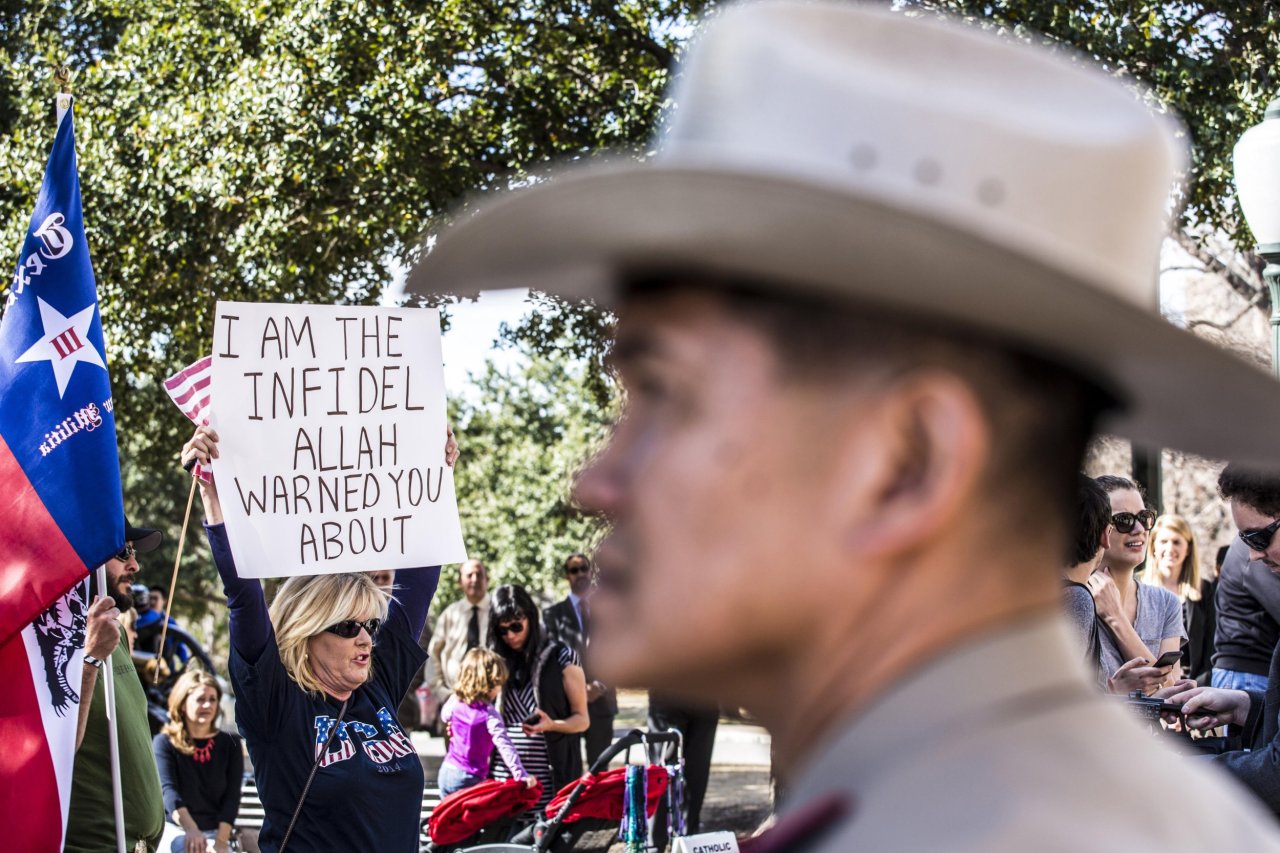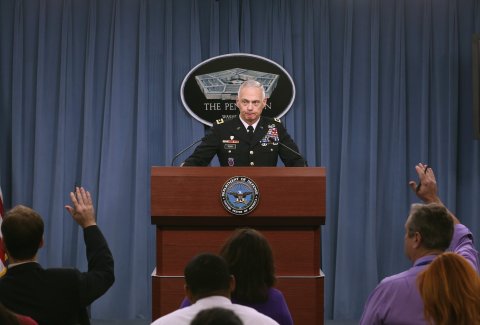
🎙️ Voice is AI-generated. Inconsistencies may occur.
They are convinced the world is reaching End Times, the apocalypse foretold in Scripture. They believe Jesus the Messiah will then return to join the faithful in a battle against the antichrist. The glorious confrontation will be won, with Jesus and his followers reigning supreme after the defeat of evil.
And who are these believers? No, not evangelical Christians—they're the members of ISIS.
If that's surprising, it reflects the general lack of understanding about this group. That Jesus will return in humanity's last days is a tenet of fundamentalist Islam and is a driving force behind some of ISIS's decisions. Unfortunately, many Americans have fallen prey to the idea that studying the enemy is a sign of placation or weakness. Too many people—led by disingenuous or ignorant politicians—take pride in their refusal to make the militarily essential decision to learn about the extremists.
That is not analysis from armchair warriors. The importance of learning about the adversary is accepted military strategy, included in The Art of War, the ancient Chinese treatise on combat attributed to a general named Sun Tzu. The book is considered so important to warfare tactics that it is required reading for all CIA officers and is taught at every American military academy. It states, "If you know the enemy and know yourself, you need not fear the result of a hundred battles. If you know yourself but not the enemy, for every victory gained you will also suffer a defeat."
When it comes to ISIS, our failure to understand the enemy is clear in the fumbling, self-defeating way the United States has handled the problem of Syrian refugees fleeing the violence inflicted by militants and the government of Bashar al-Assad. Driven by fearmongering primarily pushed by Republican governors and presidential candidates, Americans are frightened that terrorists might hide among refugees brought into the country. This is a nonsensical construct built on ignorance; ISIS does not need refugees to infiltrate the West. Thanks to its relentless propaganda on social media that is aided by ignorant American politicians, ISIS has recruited thousands of residents in Europe and a few dozen in the United States, according to the CIA. And they, obviously, do not need to pose as refugees.
"It is true that ISIS could exploit the crisis to insert operatives into Europe," according to Aaron Zelin of the Washington Institute for Near East Policy. "At the same time, however, one must remember that the group already has thousands of members with European Union passports and has very good document forgers. Therefore, the sole reason for nesting additional operatives in the refugee flows would be to spark a backlash against Syrian and other refugees as well as the native Muslim populations."
So the extremists have easier ways to enter the United States than by posing as refugees. This is important to consider because by keeping refugees out American politicians are aiding and abetting ISIS (and accomplishing nothing). Ironically, the flow of Syrians away from Islamic countries infuriates the group, since it undermines ISIS's claim that it is forming an Islamic empire that will protect devout Muslims. Essentially, every Syrian family that takes the dangerous trip to other countries communicates to Muslims worldwide that they would rather risk death than remain near ISIS.
In response, the group has released at least 12 videos attempting to persuade Syrians to stay put. The videos warn Syrians fleeing to the West that they will be forced to convert to Christianity—a claim they back up with reckless statements by Western politicians and commentators. Spokesmen on the videos say Westerners will attack Syrians, then they show film clips of police beating refugees in Europe. They say refugees will be treated with contempt, and they have lots of evidence backing up that charge.
In other words, those in America and its Western allies who refuse safe haven to Syrian refugees out of misplaced fear that terrorists might slip in alongside them are doing ISIS's work. "The refugee baiters, their rhetoric and their proposed policies will lead to self-fulfilling ends and make everyone less safe," Zelin says.
Ignorance of ISIS is also driving calls for simplistic military solutions. This relates to the group's belief in the End Times. In 2014, ISIS waged a bitter fight against other Sunni Muslims to gain control of Dabiq, a Syrian town of no strategic significance. Yet it is there, according to an Islamic prophecy, that the battle against the antichrist will be fought. And now, as more countries join the fight against ISIS, its members cheer—believing the prophecy comes ever closer that 80 flags (nations) will gather in Dabiq to wage war, with Jesus leading Muslims to victory.
The antichrist in this battle is a liar with one eye, and some followers of ISIS believe they know his identity. The indispensable book The ISIS Apocalypse by William McCants of the Brookings Institution, quotes a tweet by an ISIS acolyte following the attack on the Charlie Hebdo newspaper office in Paris that proclaimed: "The West is the one-eyed deceiver."

Why is this important? Because it tells us ISIS fighters will not run from a military confrontation; they crave it. Its members do not fear death in battle; they pray for it. American politicians who proclaim they will terrify ISIS with their commitment to fight do not understand what motivates the enemy. Saying, "We will look for you, we will find you, and we will kill you," as Marco Rubio did in May might satisfy tough-guy emotional impulses (his words are plural versions of sentences straight out of the action movie Taken) but they are promises that bring joy, not fear, to ISIS fighters. Calling for the bombing of refineries, as Donald Trump wants, accomplishes nothing; putting boots on the ground in Iraq, as Jeb Bush and Ben Carson have demanded, would drive away the Iranians fighting there while leaving ISIS's primary stronghold in Syria untouched. Of course, this does not mean the West should abandon military strategies; the American-led campaign called Operation Inherent Resolve has shown effectiveness in driving back ISIS. What is clear, though, is that politicians who build their strategy under the belief that Sunni fighters can be frightened by promising more bombs and troops are as deluded now as they were when America invaded Iraq in 2003.
Fortunately, even if the politicians do not understand ISIS, military strategists do. In 2014, government strategists from more than 30 countries gathered at MacDill Air Force Base. There, according to two military officers who attended, the group engaged in "red teaming," which involves anticipating what the enemy will do. The issue of the End Times was discussed, as was the fact that the prospect of death would not frighten ISIS fighters.
The strategists also assessed ISIS's strengths and weaknesses. Two are important here. One limitation is that ISIS has no real allies among Arab powers—even Al-Qaeda is an enemy. That is why it engages in grotesque barbarity against Syrian and Iraqi Muslims; ISIS wants to force people to choose sides. Join them and enjoy their protection, reject them and die a horrible death.
The strategists at MacDill concluded that ISIS's strength comes from persuading Muslims worldwide, particularly in Europe, that the West wants to destroy Islam. Unfortunately, many politicians seem determined to reinforce that message here.
For example, the argument that Islam is a religion of pure violence is idiocy. (For those who point to the brutality in portions of the Koran as "proof" that all Muslims are violent, read the Old Testament; slaughter and torture in Scripture are commonplace.) According to the CIA, ISIS fighters are just 0.002 percent of the world's Muslims, slightly more than 30,000 people. To give a sense of scale, a greater percentage of Americans showed up this past August in Carver, Oregon, to bob on rubber rafts down the Clackamas River for the Big Float 2015 celebration.
There are, however, Muslims who, while not yet violent, are open to claims that the West is engaged in a battle against Islam. When knuckleheads march with assault rifles outside of American mosques, ISIS tweets the news as proof that the West wants to destroy their religion. When Donald Trump proclaims American Muslims should wear badges, there is dancing at ISIS camps as militants spread the word across the Internet. When Republican politicians demand that President Barack Obama say America is fighting "radical Islam," ISIS cheers; the term is avoided not for politically correctness but because it is considered a compliment among fundamentalist Muslims. In other words, bandying about the term makes ISIS more attractive to Muslims who are on the fence about whether to join.
So America and its political leaders have to decide: Will they continue to condemn as weak those officials who attempt to comprehend ISIS? Will they allow fear to strengthen the enemy? Will they keep trying and insult extremists by calling them practitioners of radical Islam, even though doing so delights and strengthens the enemy?
It is more important to be tough than to sound tough. That lesson, combined with greater amounts of courage and humanity by America's leaders and its citizens, is the prescription for victory against this zealous foe.





